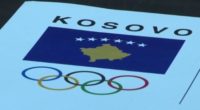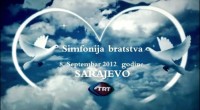On February 17th, 2008, almost three years ago, the government of Kosovo declared their independence from Serbia. Since this date, there have regularly been speculations about a possible participation of the country in the Eurovision Song Contest.
But does the Kosovan music scene offer anything to the Eurovision Song Contest? Or would it be just another participant from the Balkan who would enforce the accusations of block voting
Well, at the moment there is no need to worry because a participation of Kosovo is not possible yet. To take part in the Eurovision Song Contest, the national broadcaster has to be a full member of the European Broadcasting Union. Kosovo’s public broadcaster RTK (Radio Televizioni I Kosovës) is working hard to become a full member of the EBU which would allow a participation in the Eurovision Song Contest.
So far, the EBU has 75 active members from 56 countries. RTK has currently an observer status. The biggest problem seems to be that the country has not been accepted by all European countries as an independent state so far. Among the countries which regard the smallest state of the former Yugoslavia still as a part of Serbia we find Spain, Slovakia, Romania Greece, Cyprus, Russia and of course Serbia.
If we assume that Kosovo would enter the Eurovision family soon, it will be exciting for fans what they can expect from the Kosovan music scene. I am sure they won’t be disappointed.
During the Balkan wars a lot of refugees from Kosovo came to Germany. I had the opportunity to meet a few of them. My Mum was always worried about that because she believed the media and thought that most of the Kosovans were dangerous. I quickly discovered that this was not the case and due to this, I was not only lucky to get to learn a bit of the Albanian language and the Albanian cuisine, but especially I learned to love the Kosovan music scene. I am sure that there are several good artists who would be an adequate representative of their country at the Eurovision Song Contest and want to introduce some of them.
My favourite artist is Leonora Jakupi. Leonora was born in 1978 in the city of Skenderaj. She is one of the most popular singers among the Albanian public in Kosovo, Albania, Macedonia and Montenegro. She is known for modern pop music, as well as old style Albanian folk music. Her most popular song is A vritet pafajsia (Can innocence be killed?) which was published during the Kosovo war in 1998. Since 2001 she has released 4 CDs and several successful singles.
Adelina Ismajli, born in 1979, is definitely one of the most popular singers of the country. She became famous in 1997 when she was chosen as Miss Kosova. After that she released six CDs. Her style can be described as a mixture between pop music and Balkan turbo folk. Her first hit was 100% zeshkane (100% brunette). I can recommend the CD S’jam sex bombë (I am no sex bombe) which was released in 2000. This was actually my first Albanian album and the CD contains an interesting mixture of pop music, dance, rock, ballads and folk music.
Some of Adelina’s songs contain appeals for the independence of Kosovo. She performed the song Skenderbe right after the independence declaration in 2008. In 2004 she advertised for the Kosovan president Ibrahim Rugova. Because of her extravagant look she is often compared to the Serbian turbofolk singer Svetlana “Ceca” Raznatovic and is called the Kosovan Ceca.
Among the young population Dafina Zeqiri has become one of the most popular artists. Dafina was born in Sweden in 1989. She is one of the most known R&B singer in the Albanian language area. She became famous in 2007, when she won the competition Polifest with the song Rrallë E Përmallë. The following year she won the audience price and succeeded with the song Amazing girl in 2009. So far Dafina has released one album and several singles.
Other popular artists are Mimoza Shkodra, Zanfina Ismajli (Adelina Ismajli’s little sister), Vesa Luma, Edona Llalloshi, Gentiana Ismajli and Gjyste Vulaj.
Beside the modern pop music, the traditional Albanian folk music is still very popular in Kosovo. One of the most successful artists is Shkurte Fejza whose song E kam emrin kosovar (My name is Kosovan) can be seen as a hymn of all Kosovo Albanians. In the former Yugoslavia her music was completely forbidden from 1981 to 1983. Until the independence of Kosovo her music was neither played on the radio, nor seen on TV.
If you now think that there are only female artists in Kosovo, I have to say that you are wrong. There are of course popular male artists as well.
One of the most popular male artists is Sabri Fejzullahu who is not only a very successful singer. He is also known as an actor who sold a lot of records and had lots of performances in the Kosovan television.
Other popular male singers and worthy representatives of Kosovo in Eurovision are Ilir Shaqiri and Sinan Hoxha.
In general music has a very high meaning to the Kosovans. There are special programs at every New Year’s Eve which contain a mixture of comedy and music. The country’s most popular singers perform and a DVD is released afterwards with the title Gezuar vitin e ri (Happy New year).
So I think there are enough possible candidates for representing Kosovo in Eurovision. Indeed the capital of Kosovo, Prishtina, already has a connection to the Eurovision Song Contest. In 1986 the votes of the Yugoslavian jury were announced from there. We will see, if this remains the only connection to Eurovision or whether we can welcome Kosovo to the Eurovision family.
In my opinion it would be an enrichment for all Eurovision fans, no matter what the political status says.



















